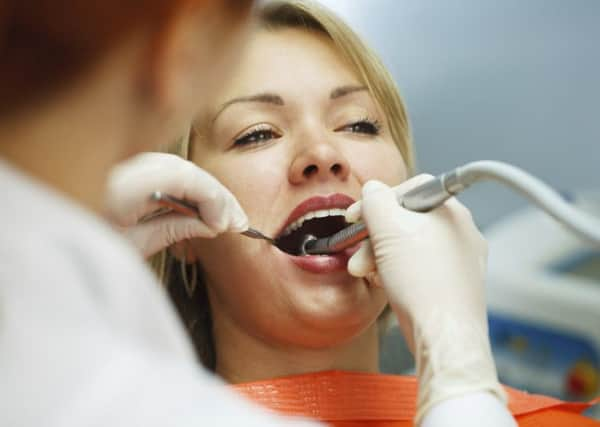How to spot early signs of mouth cancer


SO you’ve got the Hollywood smile, the sparkling gnashers and the minty fresh breath.
When it comes to mouth health, it’s the state of our pearly whites that most of us worry about most.
Advertisement
Hide AdAdvertisement
Hide AdWe’ve all seen ‘shocking’ reports on the extent of our nation’s tooth decay, headlines warning about the link between gum and heart disease and we’re more concerned than ever about how sugary drinks and fruit juices can erode tooth enamel.
But while we’re busy checking out how our pout looks in those Instagram selfies, there could be a hidden horror waiting to wipe the smile right off our faces. According to the British Dental Health Foundation, one in ten of us is unaware of the threat of mouth cancer.
As Mouth Cancer Action Month reaches its peak, now seems the perfect time to chew over the facts.
How common is it?
Mouth cancer occurs in a number of different forms, including cancer of the tongue, oral cavity, lips and throat. There were more than 6700 cases of mouth cancer diagnosed in the UK last year, which equates to 18 people a day. In Scotland, there are 500 new cases each year. Mouth cancer is twice as common among males as females – 14 per 100,000 males are affected and seven per 100,000 females.
Mouth cancer is “relatively uncommon, accounting for about 1 in 50 of all UK cancer cases,” notes Dr Steve Preddy, Bupa’s clinical director of dentistry. However it is currently the 16th most common cancer. And cases have trebled in the last decade with numbers expected to continue rising.
Who’s most at risk?
Smoking is, by far, the biggest known risk factor, with a morning ciggie doubling a person’s chances of developing the disease.
Alcohol is also linked with mouth cancer, and those who drink and smoke a lot are up to 30 times more likely to get it. While poor oral health can be a factor, so too can our craving to have a sparkling clean mouth: the International Agency for Research on Cancer recently found excessive use of mouthwash – more than three times a day – can increase the risk.
Oral cancer has increased dramatically since the 1970s, up by 300 percent. Three quarters of cases are linked to tobacco or alcohol.
Advertisement
Hide AdAdvertisement
Hide Ad“Most cases first develop in older adults aged between 50-74 years, and it’s generally more common in men than women,” says Preddy. “This is thought to be due to the fact that, on average, men drink more alcohol.
“Most cases are linked with the use of tobacco products, especially in combination with alcohol.
“Scientists also believe a poor diet and family history of the disease are significant risk factors, plus it’s thought people with six or more missing teeth are more commonly affected.
How serious is it?
All cancers are potentially serious but, as with the vast majority of cancers, early diagnosis is key – if caught and treated early, survival rates for mouth cancer are relatively good, sitting at 90 per cent in fact.
Although the number of cases has risen over recent years, treatments have also improved and the prognosis is generally much better.
However, the disease still kills more than 2000 people in the UK each year, which is more than testicular and cervical cancer combined.
What are the warning signs?
Your dentist may spot signs of mouth cancer long before you do – which is why it’s absolutely crucial not to skip dental appointments; even if you think your gnashers are fine, regular check-ups could save your life.
Dentist Alex Coakley of Montgomery Street Dental Care in Edinburgh says patients usually don’t even realise they’re undergoing what could be a life-saving check-up while they are sitting in the dentist’s chair.
Advertisement
Hide AdAdvertisement
Hide Ad“We do a check for mouth cancer at every single check up,” he explains. “Whenever someone comes in, we have a good look at teeth and gums, the state of the tongue, we check the palate and the soft tissue under the tongue and the back of the mouth.
“That’s why it’s crucial to have regular check ups.”
There are some potential symptoms that you may spot.
Ulcers which may be painless which have been present for more than three weeks, red and white patches and unusual lumps and swellings around the mouth, tongue, lips and neck area are worth having checked.
They can be linked to other less serious conditions, but it does no harm to have an expert eye take a look.
How is it treated?
Early detection is vital and survival rates beyond five years are high.
“We have fast-tracked people for treatment and referred patients,” says dentist Alex Coakley. “Sometimes it turns out to be benign.
“However we’ve had one instance a couple of years ago which led to someone undergoing quite major surgery which was lifesaving.”
Surgery is common for mouth cancer patients. Checks are also made to ensure the cancer has not spread to the lymph nodes around the mouth or neck.
Some early stage cancer can be treated with laser surgery, others can be treated using radiotherapy alone.
Should I panic?
Advertisement
Hide AdAdvertisement
Hide AdAccording to dentist Iain Tunnah, of Church Hill Dental Practice, it is better to be safe than sorry, but at the same time, don’t worry.
“While oral cancer is increasing, the prevalence is still relatively rare. I think people are more aware of what is going on in their mouth now than ever.”
A dental check up can be reassuring , he adds.
He recommends avoiding smoking and limiting alcohol – including alcohol-based mouthwashes.
For more information visit www.mouthcancer.org
Montgomery Street Dental Care: http://www.mgsdental.co.uk